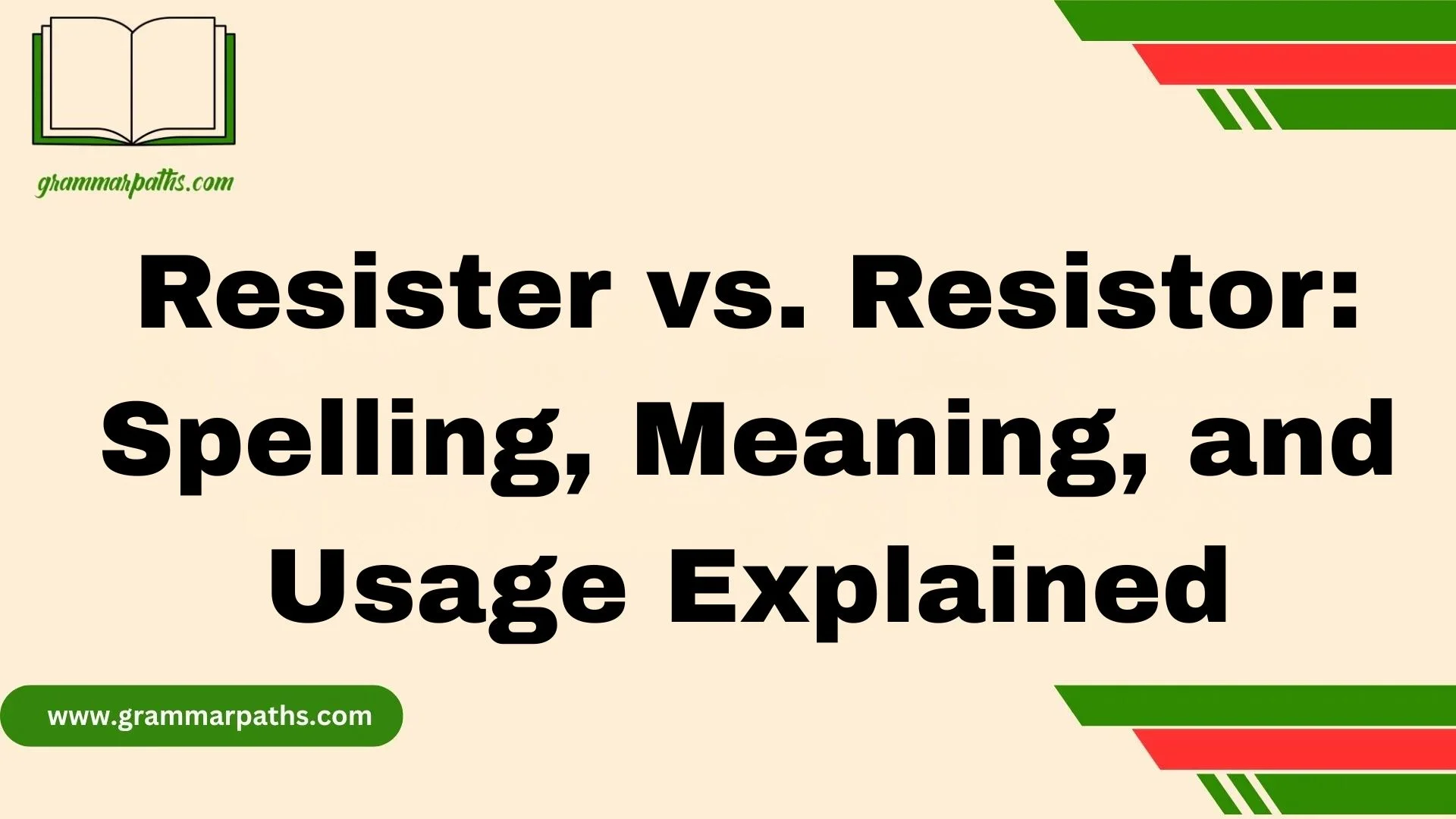In my early days working with circuits, I learned how important a resistor is when managing electricity. It’s a small electrical component designed to control the passage of current, preventing damage to other parts. Without the right resistor, the current could surge and burn delicate parts of a project. I remember measuring an original circuit and realizing the spelling on the schematic said “resister” instead of resistor—a small error that could confuse beginners. Historical notes show that in the 1300s, resister was the common term, but by 1905, it had taken on its modern technical meaning, describing the exact part I was holding in my hand.
Even though the words look alike, the resistor has a very different role from a resister in language. In practical work, every component on the board has its place, and the mean purpose of a resistor is to keep the control of electricity steady. Whether repairing an old radio or building a DIY project, understanding how this part resists the passage of electrical flow is essential. Once, I swapped the wrong value and had to redo the entire design—proof that even a small oversight in current regulation can change the outcome.
What Are Homophones?
Homophones are words that sound exactly the same but have different meanings, spellings, or both. English is full of them:
| Homophone Pair | Meaning 1 | Meaning 2 |
| Flour / Flower | Ground grain for baking | Bloom of a plant |
| Sight / Site | Vision | Location or place |
| Resister / Resistor | A person who resists | Electrical component |
Homophones can be tricky because our brains process speech by sound, not by spelling. This means that when you hear someone say “resistor,” your brain has to use context to decide which meaning applies.
The confusion between resister and resistor happens because:
- They sound identical.
- They differ by only one letter.
- One is more common in everyday writing (resistor in technical circles, resister in historical/political contexts).
Breaking Down “Resister”
A resister is a person who opposes, defies, or fights against something. It comes from the verb “resist,” meaning “to withstand or oppose.”
Definition
- Resister (noun): Someone who actively refuses to accept or comply with something.
Historical Origins
The word comes from the Latin resistere, meaning “to stand back” or “to oppose.” It entered Middle English in the late 14th century and has been used to describe rebels, protesters, and anyone taking a stand against authority or force.
Common Contexts for “Resister”
- Political movements: “She was a resister against oppressive laws.”
- Military history: “The resistance fighters were brave resisters of occupation.”
- Social change: “He became a resister to unfair workplace policies.”
Example Sentences
- The resisters gathered in the city square to demand justice.
- History remembers her as a resister who stood against tyranny.
- During the war, local resisters sabotaged enemy supply lines.
Understanding “Resistor”
A resistor is a passive electronic component used to control the flow of electric current in a circuit.
Definition
- Resistor (noun): An electrical device that resists the flow of current, often to control voltage or protect components.
Technical Background
Resistors are fundamental building blocks in electronics. They are made from materials that limit electrical flow, measured in ohms (Ω).
Types of Resistors
| Type | Description | Common Use |
| Fixed Resistor | Has a set resistance value | Voltage control, circuit stability |
| Variable Resistor (Potentiometer) | Resistance can be adjusted | Volume controls, tuning devices |
| Thermistor | Resistance changes with temperature | Temperature sensing |
| Light Dependent Resistor (LDR) | Resistance changes with light levels | Light-activated switches |
How Resistors Work (Simplified)
- Electric current wants to move freely through a conductor.
- A resistor slows it down, similar to how a narrow pipe slows water flow.
- This control helps prevent overheating or damage to sensitive components.
Example Sentences
- The technician replaced the burned-out resistor in the amplifier.
- Resistors protect delicate sensors from power surges.
- Without resistors, many electronic devices would overheat or malfunction.
Side-by-Side Comparison: Resister vs. Resistor
| Feature | Resister | Resistor |
| Part of Speech | Noun | Noun |
| Meaning | A person who opposes or resists | Electrical component that limits current |
| Field of Use | Politics, history, activism | Electronics, engineering |
| Example | “She’s a resister of unfair laws.” | “The resistor prevents excess current.” |
| Pronunciation | /rɪˈzɪstər/ | /rɪˈzɪstər/ |
| Etymology | From Latin resistere (“to stand against”) | Coined in the early 20th century from “resist” + “-or” |
Why Precision Matters
Mixing these words up can lead to:
- Miscommunication in technical manuals or political writing.
- Loss of credibility for writers, students, and professionals.
- Confusion for readers, especially non-native speakers.
Case Study: The Email Mishap
An electronics supplier once sent an email announcing a sale on “resisters.” Activists thought it was political merchandise. Engineers were disappointed when they opened the link and found no circuit parts—just protest T-shirts. This small spelling error cost the company both trust and sales.
Memory Tricks and Tips to Never Mix Them Up
Here are simple ways to keep them straight:
- Think of “resister” as a fighter – it has “-er,” like “fighter” or “worker,” which are people.
- Think of “resistor” as an object – it ends in “-or,” like “motor” or “compressor,” which are machines or devices.
- Visual clue: Imagine a protest sign for resister and a circuit diagram for resistor.
- Use a quick sentence: “The resister held a sign; the resistor held back current.”
Conclusion
While resister and resistor may look similar, they live in entirely different worlds. A resistor is a key electrical component that helps control the passage of electricity in circuits, ensuring the current remains stable and safe. On the other hand, a resister refers to someone or something that resists or stands against a force, idea, or temptation. Knowing the difference isn’t just about spelling—it’s about using the right word in the right context. Whether you’re working on a circuit board or writing a sentence, the right term makes all the difference.
FAQs
Q1: Can “resister” and “resistor” be used interchangeably?
No. A resister refers to a person or object that resists, while a resistor is an electrical part used to control current.
Q2: When did “resistor” get its electrical meaning?
The word “resistor” took on its electrical meaning in 1905.
Q3: What happens if a resistor is missing from a circuit?
Without a resistor, the current can flow too quickly, potentially damaging components or causing the circuit to fail.
Q4: Which term is older, “resister” or “resistor”?
Resister is older, with origins tracing back to the 1300s.
Q5: Why is knowing the difference important?
Because the meanings are completely different, using the wrong term can lead to technical errors or misunderstandings in communication.

Grace Marie is the dedicated writer behind GrammarPaths.com, where she shares her passion for English grammar, idioms, and writing mastery. With a strong background in language studies and years of experience helping learners improve their communication skills, Grace creates clear, practical, and engaging content that makes English easy to understand.










